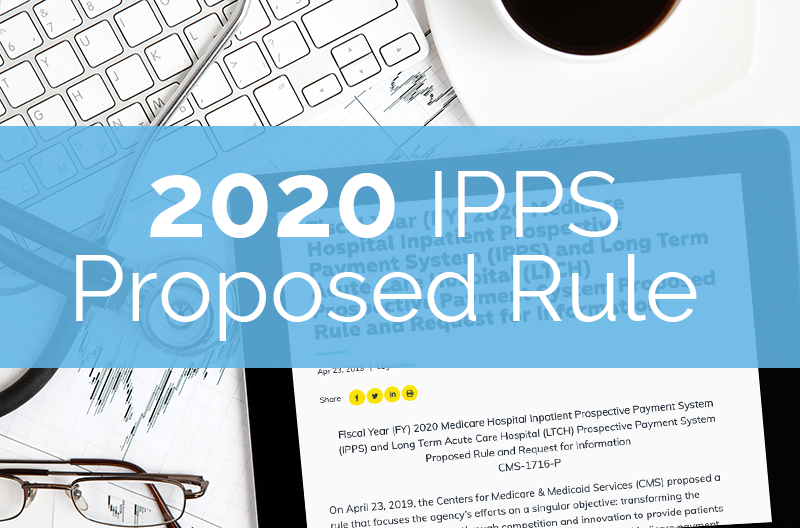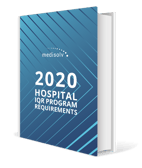9 Highlights from the 2020 IPPS Proposed Rule

CMS dropped the 2020 Inpatient Prospective Payment System (IPPS) proposed rule, which focuses on measure adjustments to reduce quality reporting burden, supporting quality care in rural areas and revising policies related to new technology add-on payments.
If you haven’t been able to get through the grueling 1,800+ pages, don’t fret. We have you covered with the highlights of the proposed changes below!
Let’s take a look at what CMS has in store for us in 2020.
1. Measure Changes: The Hospital IQR program adds two new opioid-related eCQMs and a Hybrid measure.
Last year, CMS finalized the removal of dozens of measures from the IQR program in 2019 and beyond to focus on more meaningful, patient-centered outcome measures. You can check out the full list of IQR measures being removed for 2019-2021 here.
In this rule, CMS proposes to make additional measure changes:
• Adopt two new opioid-related eCQMs beginning with the CY 2021 reporting period:
o Safe Use of Opioids – Concurrent Prescribing
o Hospital Harm – Opioid-Related Adverse Events
• Remove the Claims-Based Hospital-Wide All-Cause Readmission measure and replace it with the Hybrid Hospital-Wide All-Cause Readmission (Hybrid HWR) measure. CMS is proposing to start with two voluntary reporting periods, July 1, 2021 - June 30, 2022, and July 1, 2022 - June 30, 2023, before making the measure a requirement in 2024.
The Hybrid HWR Measure
Keep in mind that the voluntary submissions for the Hybrid HWR measure will have no impact on your Medicare payment determination. As part of the pilot program in 2018, CMS received 150 voluntary hybrid submissions—and a whopping 69 of those were submitted by Medisolv clients! Check out the video below to learn more about the Hybrid HWR measure.
2. CMS adds Opioid eCQMs to their list of available measures.
The reporting requirements for the IQR program largely remain the same over the next few years but CMS has added two new opioid eCQMs. Here is what you need to know.
- For 2020 and 2021 you still only have to report one quarter of data for four eCQMs.
- In 2022, you still only have to do one quarter of data for four eCQMs, but one of those eCQMs must be the proposed Safe Use of Opioids – Concurrent Prescribing eCQM.
- Your EHR technology must be certified for all the available eCQMs in 2020 and beyond.
CMS has also invited people to comment on three additional new eCQMs for the IQR program.
3. Removal of the Verify Opioid Treatment Agreement measure and retracting the Query of PDMP measure for the Medicare and Medicaid Promoting Interoperability Program.
Beginning next year, CMS plans to remove the Verify Opioid Treatment Agreement measure from the Promoting Interoperability (PI) program, formerly known as the Meaningful Use program, after receiving feedback from stakeholders that the measure was burdensome and challenging to implement.
CMS is proposing that the Query of Prescription Drug Monitoring Program measure remain an optional measure for bonus points in the PI program. In 2019, CMS had previously finalized that the measure would be required, but they’ve changed that requirement in this proposal.
4. There will be new measure removal factors for the Hospital Readmissions Reduction (HRRP) program and the Hospital-Acquired Conditions (HAC) programs.
CMS is planning to adopt eight new measure removal factors for the HRRP and the HAC programs. These measure removal factors would align with the measure removal factors that have already been implemented for other quality programs such as the Hospital Value-Based Purchasing (VPB) program. You can read about the eight measure removal factors in this blog that explains how this affects the IQR program in 2019 and beyond.
5. The NHSN Healthcare-Associated Infection (HAI) measures will be calculated differently under the Hospital Value-Based Purchasing program.
Starting in 2020, CMS is proposing to use the same data as the HAC program to calculate HAI measures in the HVBP program.
Note that these NSHN measures will no longer be a part of the Hospital IQR program in 2020.
6. The wage index is being adjusted.
CMS plans to address the wage index discrepancies between rural and urban hospitals by increasing the wage index values for low-wage hospitals below the 25th percentile and decreasing the wage index values for high-wage hospitals above the 75th percentile.
CMS would cap the negative adjustment for high wage index hospitals at 5% for FY 2020. This proposed policy would be effective for at least four years starting next year.
7. Adjustments to the new technology add-on payment.
CMS is proposing to expedite the development and review of “transformative new drugs and devices.” Under the proposed rule, once the FDA provides “marketing authorization” for one of these medical devices that are in the expedited program then they receive the new technology add-on payment (as long as they meet the cost criterion).
Also new for new technology add-on payment calculations, CMS is proposing to increase the add-on payment from 50% to 65% for FY 2020. Medicare believes that paying only up to 50% of the cost of new medical technology doesn’t meet the high costs associated with these new technologies.
8. The operating payment rate is increasing.
Next year, the operating payment rate for hospitals that successfully report to the Hospital IQR program and are meaningful EHR users will increase by 3.2%. CMS estimates this to mean a $4.7 billion total increase for 2020—the largest increase in the past decade.
9. CMS is providing more money for uncompensated care
Each year CMS distributes funds to hospitals who care for more uninsured patients. They call them “disproportionate share hospitals.” This year, CMS projects that it will distribute $8.5 billion in uncompensated care payments in FY 2020, which is an increase of $216 million over last year.
CMS is requesting feedback on all their proposed IPPS changes by June 24, 2019.
We know that keeping up with these yearly regulatory changes can be overwhelming. That’s why we have dedicated clinical experts who can help you better understand what each change means for your organization and ensure you have a comprehensive quality program.
Let’s conquer your quality goals together. Send us a note today.
FREE DOWNLOAD:
2020 Hospital IQR Program Requirements eBook
Ensure a smooth and stress-free submission to the Hospital Inpatient Quality Reporting (IQR) program. Download the 2020 IQR Program Requirements eBook, which includes all you need to know to successfully complete the program in 2020.
This guide includes:
 |
|

.png?width=352&name=2026%20Quality%20Reporting%20Deadlines%20Guide%20(1).png)



Comments